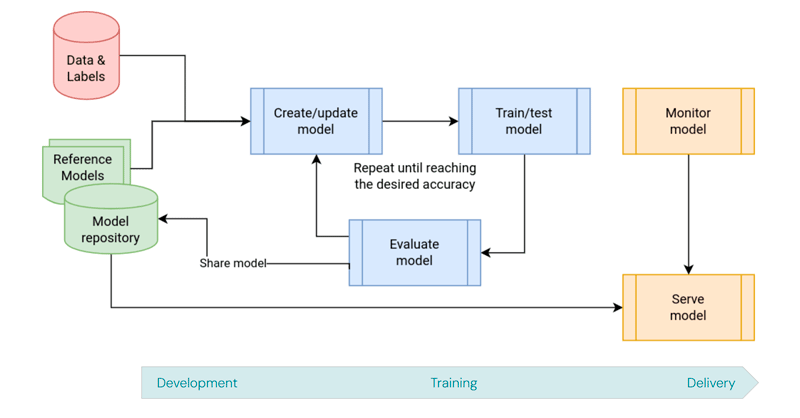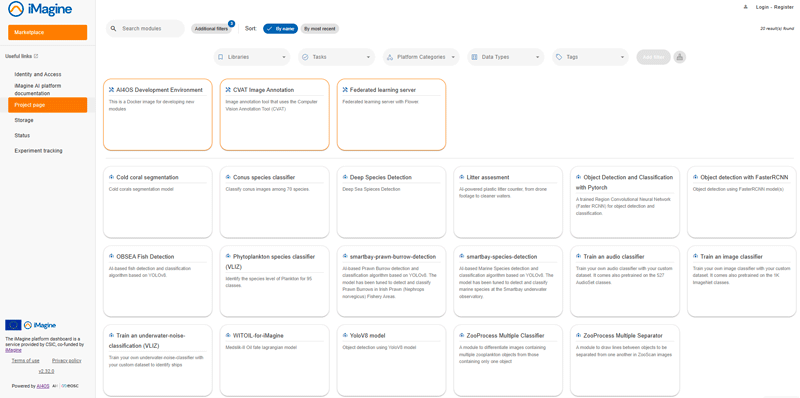by Gergely Sipos (EGI Foundation) and Dick Schaap (MARIS)
iMagine’s AI-driven platform and modules empower researchers to analyse vast amounts of images, accelerating scientific discoveries from the micro to the macro level.
iMagine [1] is a European Union-funded project that deploys, operates, validates, and promotes an AI framework and thematic image analysis services dedicated to aquatic sciences and connected to the European Open Science Cloud (EOSC) and AI4EU initiatives. Its mission is to provide researchers in aquatic sciences with open access to a wide range of AI-based image analysis services and image repositories from various Research Infrastructures (RIs). The project focuses on the overarching theme of “Healthy Oceans, Seas, Coastal and Inland Waters.”
iMagine enhances existing image analytical capabilities in the marine and freshwater sciences to improve research performance in the whole aquatic domain. Specifically, it (1) operates a generic computational platform, the ‘iMagine AI Platform’, that helps aquatic communities develop AI-based image analysis services, (2) develops and supports the development of AI-based image analysis services for 12+ specific scientific problems within aquatic research; (3) offers labelled images that can be used for the training and re-training of AI models and (4) captures and shares best practices related to imaging data and image analysis with artificial intelligence in aquatic sciences. Ultimately, iMagine delivers a portfolio of scientific capabilities that are targeted at researchers in marine and freshwater research.
The iMagine AI Platform [2], customised from the AI4OS framework [3] and supported by AI4EOSC [4], is a powerful tool designed to revolutionise aquatic science research. The platform is hosted on four OpenStack clouds from the EGI e-Infrastructure Federation to deliver GPU and storage capacity at scale and according to the dynamically changing capacity requirements of the supported use cases. The platform offers a comprehensive range of tools and techniques, including image annotation, preprocessing, deep learning models catalogue, model training and performance evaluation, model inference for scientific end users. This platform supports the entire machine learning cycle, from model development to training, validation and delivery to end users, enabling easy sharing and collaboration among AI experts and domain researchers.
By utilising artificial intelligence and machine learning, researchers can analyse vast amounts of image data from various sources, including underwater platforms, webcams, microscopes, drones, and satellites.

Figure 1: Overview of the steps supported by the iMagine platform, from development to training to delivery.
Figure 1 provides an overview of the steps supported by the iMagine platform, from development to training to delivery.
iMagine supports a growing number of use cases with the AI platform, each focusing on a different problem within aquatic sciences, and demonstrating the power of AI for image analysis in the field. The use cases address issues such as:
- classification and quantification of floating litter from drone images taken over open water surfaces,
- taxonomic identification of planktons from microscopic images,
- generating ecosystem statistics (e.g. fish occurrences) from images and video streams produced by underwater cameras,
- predicting the movement and spread of oil spills in the ocean from satellite images,
- estimating the location and movement of boats from images generated from underwater audio streams,
- monitoring the health of coral reefs from underwater images.
Figure 2 offers at a glance all available services in the platform. The services are also available in the service catalogue [5] on the iMagine website, where interested users can submit an access request before they are officially released.
The supported use cases collaborate with the platform providers using the so-called ‘iMagine Competence Centre’, a virtual support team that brings together generic AI experts, domain scientists, and image data owners. The Competence Centre convenes the stakeholders through regular meetings, training sessions, and continuous feedback collection, all designed to facilitate experience sharing and progress towards reaching precise AI models and robust online services for end-user scientists.

Figure 2: All available services in the platform at a glance.
Besides helping the use cases within the project, the Competence Centre also captures and publishes best practices, including a comprehensive overview of the AI tools and techniques used in various projects in a recent project deliverable titled “Best Practices for Producers and Providers of Image Sets and Image Analysis Applications in Aquatic Sciences” [6]. Despite this deliverable specifically focusing on aquatic sciences, it contains valuable insights that can be beneficial to researchers who face challenges in image analysis in other fields of science.
The Competence Center already supports 12 use cases; through the continuously open call on the website, we invite additional use cases to benefit from the iMagine support.
All use cases contribute to the image datasets available publicly on Zenodo [7] to validate the published AI models, retrain them, or train additional models from these data.
By adhering to best practices in data management, quality control, and model development, iMagine aims to enhance data quality, promote reproducibility, and facilitate scientific progress in aquatic research. The platform is dedicated to sharing its developments with other leading projects, such as EOSC, AI4EU and Blue-Cloud 2026, to maximise its impact and encourage the broader adoption of AI-powered solutions within the aquatic science community.
Links:
[1] https://www.imagine-ai.eu/
[2] https://dashboard.cloud.imagine-ai.eu/marketplace
[3] https://ai4os.eu/
[4] https://ai4eosc.eu/
[5] https://www.imagine-ai.eu/services/image-analysis-services-for-aquatic-sciences
[6] https://doi.org/10.5281/zenodo.13864196
[7] https://zenodo.org/communities/imagine-project/records?q=&f=resource_type%3Adataset&l=list&p=1&s=10&sort=newest
Please contact:
Gergely Sipos
EGI Foundation, The Netherlands
Dick Schaap
Maris, The Netherlands











